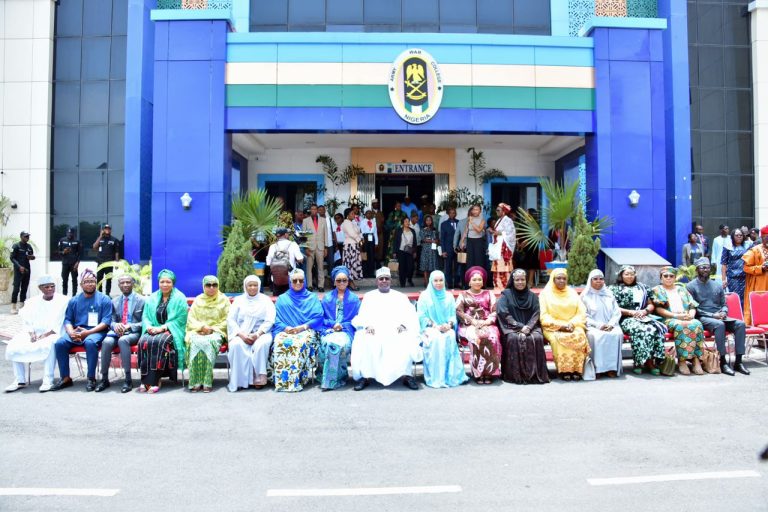
Nigeria’s First Lady, Senator Oluremi Tinubu, has called on state governments to adopt community-based strategies aligned with the National Drug Control Master Plan (NDCMP) to combat the growing scourge of substance abuse and illegal drug trafficking across the country.
Speaking at a capacity-building workshop organized by the National Drug Law Enforcement Agency (NDLEA) in collaboration with the Nigeria Governors’ Spouses Forum (NGSF) on Tuesday, May 6, 2025, in Abuja, Senator Tinubu emphasized the urgent need for a unified, grassroots-focused approach. The training aimed to equip state First Ladies with the tools to combat drug-related issues in their respective states.
In her keynote address—delivered by Hajiya Laila Jibrin Barau, wife of the Deputy Senate President—the First Lady decried the alarming rise in drug and substance abuse among Nigerian youths, particularly adolescents, warning that the crisis poses a significant threat to the nation’s future.
Drug Abuse Among Youths: A National Emergency
“This training couldn’t have come at a more critical time,” Senator Tinubu remarked. “Drug abuse has infiltrated every corner of our communities, threatening the health, safety, and future of our children. It’s no longer a problem we can afford to ignore or confront in isolation.”
She urged state First Ladies to lead by example and champion multi-stakeholder collaborations. She highlighted the need for prevention-focused initiatives, rehabilitation programs, and community reintegration of those recovering from addiction.
“Our presence here today is a testament to our shared resolve. Through honest dialogue and knowledge sharing, this workshop will equip us with the right tools to address this growing crisis through prevention, early intervention, and evidence-based treatment strategies,” she said.
Senator Tinubu commended NDLEA Chairman Brig. Gen. Mohamed Buba Marwa and his team for their unwavering commitment to combating drug abuse and trafficking, and for supporting grassroots engagement through the War Against Drug Abuse (WADA) campaign.
NDLEA: Four Years of Results and Renewed Commitment
In his opening remarks, NDLEA Chief Executive Brig. Gen. Marwa described drug abuse as a destructive force undermining public health, security, and national development.
“Unfortunately, Nigeria is not immune to the global drug crisis,” he said. “Data, academic research, and lived experiences reveal the grim reality facing our society. To achieve the vision outlined in the National Drug Control Master Plan 2021–2025, we must adopt urgent, inclusive, and practical solutions.”
Marwa shared striking achievements made by the NDLEA in recent years:
- 62,595 drug-related arrests (including 68 major drug barons)
- 10.3 million kilograms of illicit substances seized
- 11,628 convictions secured
- 1,330 hectares of cannabis farms destroyed
- 24,375 individuals received drug treatment and counseling
- 10,501 sensitisation campaigns held under WADA, reaching 3.84 million Nigerians
He encouraged the forum not to lose hope but to act with urgency and purpose: “We must not underestimate the power of community-led action. The cost of doing nothing is far greater than the cost of unified, strategic intervention.”
Marwa emphasized the importance of State Drug Control Committees (SDCCs) as a key mechanism for sustaining local engagement and urged governors’ spouses to lead efforts in establishing and strengthening them across all states.
UNODC and ECOWAS Support Decentralized Drug Response
Cheikh Ousmane Toure, Country Representative for the United Nations Office on Drugs and Crime (UNODC), echoed the call for localised solutions, stating, “If the roots of this crisis lie in our homes and schools, then the solution must begin there too.”
He charged state First Ladies with leveraging their unique influence to champion three core actions:
- Prioritizing budgetary support for prevention and treatment programs.
- Establishing state-specific drug control task forces aligned with national objectives.
- Setting up community-based drop-in centers and safe spaces for counseling and recovery.
Toure emphasized the importance of tailoring interventions to suit each state’s cultural context and decentralizing access to treatment to reach the most vulnerable populations.
ECOWAS and Health Experts Reinforce Grassroots Action
Dr. Daniel Amankwaah, Head of ECOWAS Drug Prevention and Control Division, called for stronger resource commitment at both state and local levels to support rehabilitation and prevention services.
The workshop also featured a technical session led by top drug policy experts and public health professionals, including Dr. Martins Agwogie, Prof. Akintunde Oyedokun, Dr. Akanidomo Ibanga, Dr. Abubakar Salami, Dr. Ngozi Madubuike, and Dr. Kunle Adeshina. They provided practical insights into best practices for community mobilization, behavioral therapy, and reintegration strategies.





